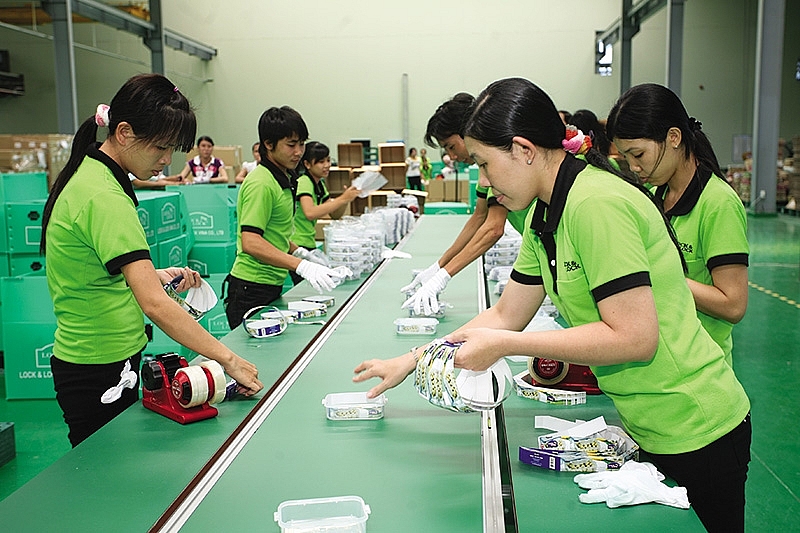South Korean M&A wave rises
 |
| South Korean investors are shifting their focus in Vietnam from direct investment to M&A deals, Photo: Le Toan |
South Korea’s eagerness to directly invest in Vietnam is nothing new. However, the mergers and acquisitions (M&A) wave between Korean and Vietnamese businesses only emerged in recent years, and is now growing from strength to strength.
In just the last month, two major partnerships have been cemented. ASAM Asset Management bought VND200 billion ($8.85 million) of convertible bonds from Vietnamese textile manufacturer TNG Investment and Trading JSC. The new capital from ASAM will help TNG improve its financial health, invest more heavily in assembly lines, and seek customers shifting their production base away from China. According to industry insiders, ASAM has only been in Vietnam for five months, and this is the first major deal from the investor.
“It took us only 10 weeks to negotiate and finalise the deal with ASAM, who believe that we can grow by 20 per cent per year despite our own forecasts of only 10 per cent. The money will reach our account in October and we will carry out expansions immediately,” said Nguyen Van Thoi, chairman of TNG.
A week earlier, South Korean conglomerate SK Group spent $470 million on a 9.5 per cent stake in Masan Corporation, a diversified group in Vietnam with operations in consumer goods, mining, and chemical processing. SK also pledged to become Masan’s strategic partner, with a view to pursuing joint business activities in Vietnam and expanding to nearby markets together.
It is clear that partnering with SK will be a tremendous advantage for Masan. SK is South Korea’s third largest business group behind Samsung and Hyundai, and it is planning to synergise activities with ASEAN companies. A notable example is ride-hailing firm Grab, which also received strategic investment from SK in April. The two partners are rolling out plans to combine SK’s mobile technology, map services, and electric vehicle battery with Grab’s ride-hailing platform.
In August, Hanwha Asset Management paid $400 million for 84 million preferential shares in Vingroup. The sale came after Hanwha’s unsuccessful attempt to join the $13.5 billion public debut of Vinhomes, the property arm of Vingroup, back in May.
The recent deals of ASAM, SK, and Hanwha in Vietnam are just three of the many M&As between South Korean and Vietnamese companies since 2017. The financial industry has received the greatest interest, with investors such as KIM Asset Management, Lotte Card, and KB Financial pouring big money into Vietnam’s Viet Capital Securities, Techcombank, and Maritime Securities. Samsung Securities also teamed up with Dragon Capital, the longest-running fund manager in Vietnam.
At the recent Vietnam M&A Forum 2018, South Korea’s latest investment wave to Vietnam was highlighted by industry experts. Most agreed that investors are spurred by the New Southern Policy proposed by South Korean President Moon Chae-in earlier this year for closer collaboration with ASEAN members. As growth inside South Korea continues to slow down and geo-political concerns sever business ties with China, South Korean businesses are looking for new opportunities further south, particularly in fast-growing Vietnam.
However, unlike in previous years, when South Korean investors poured direct capital into labour-intensive sectors such as textile, they now prefer to partner up with Vietnamese businesses in M&A deals.
Jiun Park, deputy director of the Global M&A Facilitation Centre at the Korea Trade-Investment Promotion Agency, said that the attention is now on Vietnam’s growing domestic market. “An increasing number of South Korean small- and medium-sized companies are keen on Vietnam. South Korean investors put in $300 million of M&A capital in Vietnam last year, and $200 million in the first half of 2018,” said Park, adding that Vietnam is an important base for South Korean investors to venture into Myanmar, Laos, and Cambodia.
Other experts noted that South Korean investors are often quick to make investment decisions and willing to transfer technology to Vietnamese partners. Young-sup Joo, former Minister of Small- and Medium-Sized Enterprises and Startups in South Korea, said that this is a win-win situation, as the South Korean partner can offer hi-tech solutions, while the Vietnamese partner can leverage its strong domestic network and existing market share.
What the stars mean:
★ Poor ★ ★ Promising ★★★ Good ★★★★ Very good ★★★★★ Exceptional
Related Contents
Latest News
More News
- State corporations poised to drive 2026 growth (February 03, 2026 | 13:58)
- Why high-tech talent will define Vietnam’s growth (February 02, 2026 | 10:47)
- FMCG resilience amid varying storms (February 02, 2026 | 10:00)
- Customs reforms strengthen business confidence, support trade growth (February 01, 2026 | 08:20)
- Vietnam and US to launch sixth trade negotiation round (January 30, 2026 | 15:19)
- Digital publishing emerges as key growth driver in Vietnam (January 30, 2026 | 10:59)
- EVN signs key contract for Tri An hydropower expansion (January 30, 2026 | 10:57)
- Vietnam to lead trade growth in ASEAN (January 29, 2026 | 15:08)
- Carlsberg Vietnam delivers Lunar New Year support in central region (January 28, 2026 | 17:19)
- TikTok penalised $35,000 in Vietnam for consumer protection violations (January 28, 2026 | 17:15)

 Tag:
Tag:



















 Mobile Version
Mobile Version